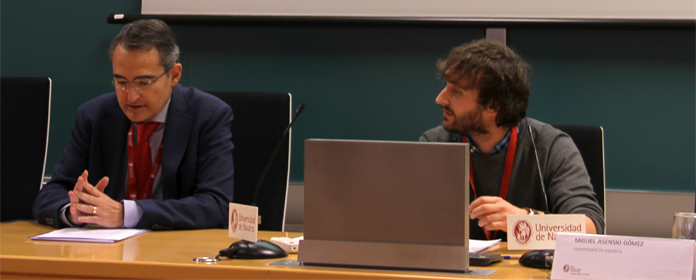The construction of narratives on religious freedom and Church-State relations at discussion in a congress of the Institute for Culture and Society
The event is part of a research of project 'Religion and Civil Society' and is funded by the Ministry of Economics and Competitiveness.

PHOTO: Natalia Rouzaut
How have political positions on the role of the Church in public life and the exercise of religious freedom been shaped? A congress of the project 'Religion and Civil Society' of the Institute for Culture and Society (ICS) of the University of Navarra has analyzed the historical narratives constructed in the nineteenth and twentieth centuries to defend these ideas.
Sixteen researchers from various universities in Spain, Italy and Mexico participated in the congress . Topics such as religious freedom and the Mexican revolution, the conflict between royalism and the authority of the Pope in the 18th century, relations between the Catholic Church and the anarcho-syndicalist workers' movement, and tolerance and religious freedom in Spain during the Restoration have been discussed.
For Rafael García, organizer of the event and researcher of the ICS, "historical narratives serve to legitimize some political options to the detriment of others", so it is important to investigate them. According to him, they select some events of the past and give them an interpretation according to a political intentionality, so they can both create and avoid social conflicts.
Liberal narrative and religious counter-narrativeSpecifically, the event analyzed the liberal narrative, which assumed the incompatibility between Catholicism and religious freedom, and the Catholic confessional counter-narrative that saw religious freedom as a threat to religion. In this way, García assured that these narratives have tended to highlight the conflict between the Catholic defense of its protagonism in the new liberal societies, with the State's pretensions to monopolize the public space.
For the organizer, the liberal narrative has prevailed from the Modern Age until the Second Vatican Council. "Now other narratives are being used to confront major issues in social life, such as the integration of Muslim minorities in Western societies," he said.
"Other historical narratives and counter-narratives can show a capacity to integrate groups in modern multicultural societies," the expert said. He stressed that this can be seen in the existing narratives in the relations between the West and Islam and could be applied to political problems, such as the conflict in Palestine or the separatisms in Spain.
This congress is part of the subproject 'Narratives in conflict: religious freedom and Church-State relations in the nineteenth and twentieth centuries', framed in the project 'Religion and Civil Society' and is funded by the Ministry of Economics and Competitiveness of the Government of Spain (Ref. DER2016-76619-P).
